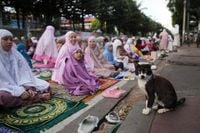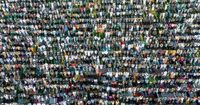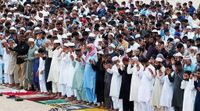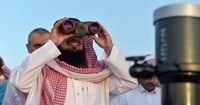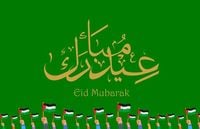Eid ul Fitr 2025 has officially begun, marking a moment of celebration for millions of Muslims worldwide. The festival, which signifies the end of Ramadan, commenced on March 30, 2025, in Saudi Arabia and several other countries, including the United Arab Emirates, Qatar, and Kuwait. Saudi officials announced the date just after 3 PM (UK time) on Saturday, March 29, confirming the sighting of the crescent moon, which is essential for determining the start of Shawwal, the month following Ramadan.
As the sun set in Saudi Arabia, the announcement came that Eid ul Fitr would be celebrated the next day, immediately concluding Ramadan. Traditionally, Eid ul Fitr, meaning 'festival of breaking the fast,' lasts for three days, filled with prayers, feasting, and family gatherings.
However, the announcement sparked a debate among astronomers and moonsighting experts. The UK-based HM Almanac Office had predicted that the crescent moon would not be visible on March 29, stating, "Sightings of the crescent moon are unlikely for most of the globe on Saturday due to the timing of the new moon." They noted that the moon would be invisible from many regions, including the Middle East and Europe, even with telescopes.
Despite these predictions, officials from Saudi Arabia's Two Holy Mosques, which include Al-Masjid al-Haram in Mecca and Al-Masjid an-Nabawi in Medina, declared on social media that the crescent moon had indeed been sighted. A local TV reporter had mentioned the possibility of seeing the moon, albeit limited, suggesting that observers might catch a glimpse for only 7 to 8 minutes if the skies were clear.
Abdullah Al-Khudairi, one of the moonsighting observers, stated, "The disagreement over the possibility of sighting the Shawwal crescent today is not among academic experts, but rather among amateur observers." He emphasized that the conditions were favorable for sighting the moon that evening.
Critics of the Saudi announcement, however, voiced skepticism. Some social media users questioned the authenticity of the sighting, with one comment suggesting that officials might have fabricated the sighting to adhere to a predetermined calendar. Others demanded photographic evidence to support the claim.
In the UK, the New Crescent Society echoed the sentiments of skepticism, asserting that a sighting on March 29 was scientifically impossible. Midlands-based moonsighting expert Dr. Zahid Nawaz also supported this view, explaining that various factors would render the crescent invisible. He noted that a partial solar eclipse occurring that day would further obstruct visibility.
While the controversy unfolded in Saudi Arabia, Muslims in Pakistan celebrated Eid ul Fitr on March 31, 2025. Across the country, families gathered for prayers at mosques and Eidgahs, seeking blessings for unity, peace, and prosperity. President Asif Ali Zardari and Prime Minister Shehbaz Sharif extended their greetings to the nation, emphasizing the importance of charity and unity during this festive time.
President Zardari highlighted the need to share Eid's joy with those in need, calling on citizens to fulfill their obligations of Zakat and charity. He described Eid as a divine gift and urged Pakistanis to reflect the values of compassion and support for one another.
Prime Minister Sharif echoed these sentiments, stating that Eid embodies the values of happiness, gratitude, and brotherhood. He called for unity against extremism and external threats, urging the nation to remain steadfast in the face of challenges.
In a show of solidarity, the Armed Forces of Pakistan also extended their Eid greetings, highlighting the importance of unity and compassion on this auspicious occasion. The Inter-Services Public Relations (ISPR) stated, "Eid ul Fitr, marking the conclusion of Ramadan, stands as a symbol of unity, compassion, and gratitude."
Meanwhile, Muslims in Morocco celebrated Eid ul Fitr on March 31, 2025, after the crescent moon was sighted. The Moroccan Ministry of Islamic Affairs confirmed the sighting, allowing citizens to enjoy a long weekend with both Monday and Tuesday off. The holiday is marked by communal prayers and festive meals, including traditional dishes like pastries and mint tea.
In India, Muslims also celebrated Eid on March 31, following the moon sighting confirmed on March 30. The festival is a time of joy and community, marked by special prayers and gatherings. As families come together to mark the end of Ramadan, they exchange sweets and gifts, reinforcing bonds of love and friendship.
As the celebrations unfolded across different regions, communities came together to share in the joy of Eid. In Cardiff, Wales, hundreds gathered for communal prayers at Roath Recreational Ground, marking the end of Ramadan with a sense of community and togetherness. The event, organized by local mosques, brought together worshippers for prayers and celebrations.
The spirit of Eid ul Fitr transcends borders, uniting Muslims around the world in a shared celebration of faith, family, and community. As the festival continues, the emphasis on charity, compassion, and unity remains at the forefront, reminding everyone of the values instilled during the holy month of Ramadan.
